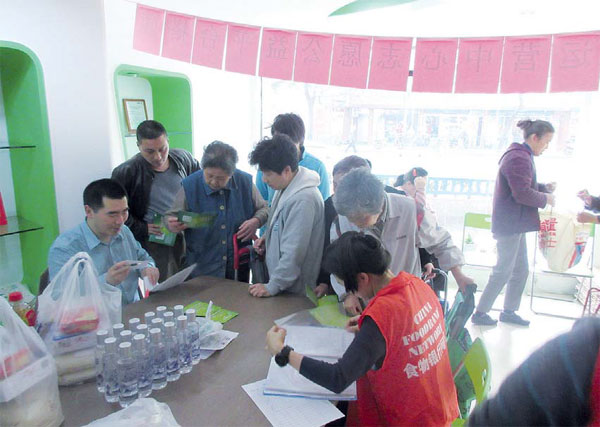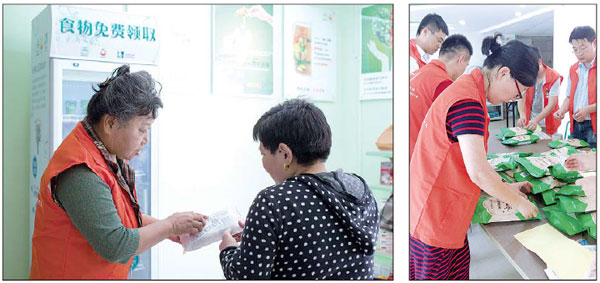Kindness you can eat

A look at the food banks in Shanghai, which were set up by Shanghai Oasis Ecological Conservation and Communication Center, and the support they have been receiving from enterprises foreign and domestic
The "solidarity fridges" that first appeared in Spain last year made their debut in Shanghai in October, with an overwhelmingly positive public reception to the concept of sharing leftovers with society's needy.
Thirty food items, including milk, yogurt, rice cakes and canned food provided by supermarkets and restaurants, are placed in a refrigerator in a community activity center on Puxiong Road, Putuo district, every weekday. Residents of the community can help themselves to the items.
Wang Longying, a volunteer who handles resident registrations - required before they are allowed to take items - said that the fridge is almost always cleared out before noon every day.
| The "solidarity fridge" in the community center in Putuo district has been well received. Photos by Gao Erqiang / China Daily |
| Right: Thirty food items, including milk, yogurt, rice cakes and canned food, are placed in the refrigerator every weekday. Left: Volunteers sort food products at a food bank in Shanghai. |
On the other side of the community activity center, however, there are shelves stocked with items such as rice, cooking oil, biscuits and milk powder. Only impoverished families in the community can access this section, and each family is limited to one food item per month.
The Shanghai Oasis Ecological Conservation and Communication Center, a nongovernmental organization, has set up four such food banks since 2014 in the districts of Pudong, Putuo and Changning. In the past two years, about 120 tons of food have been donated by more than 40 businesses, benefiting over 50,000 residents.
The problem of waste
The Food and Agriculture Organization of the United Nations found that while nearly 134 million people in China suffer from hunger, some $32 billion worth of food is thrown away annually nationwide.
It's the same story in Shanghai. According to the Shanghai Environmental Protection Bureau, more than 20,000 tons of household garbage is processed in the city every day, and food accounts for more than 10 percent of it.
Experts feel that all this wasted food can be put to better use, especially when 230,000 permanent residents in Shanghai were found by the Shanghai Statistics Bureau to be earning just 2,190 yuan ($317; 297 euros; 253) a month .
"On one hand, we hope to help impoverished families cut down on food expenses and use the money saved for health and education purposes instead. On the other, we also want to help enterprises minimize their food waste," says Zhang Qiuxia, project director of the center.
Song Chunhui, director of Tangqiao Service Center for Social Organizations, which provides policy consulting, training and cooperation for social organizations in the Tangqiao area of Pudong district, says the project is worthy of promoting because it turns individual assets that are bound for landfills into useful social assets.
"Compared with the government's subsidies for impoverished families, the project includes many enterprises and can actually reach more households. Moreover, the project is a role model that shows people how we can take targeted measures to alleviate poverty," Song says.
Zhang says people who require help from the food banks can either apply for assistance themselves or seek recommendations from their neighbors or residential committees.
Upon receiving an application, a food bank conducts a background check to ensure the authenticity of an applicant's social situation. The banks also have diversified aid plans to help families with different needs.
"The basic food package is worth around 120 yuan and includes rice, cooking oil and milk powder. We'll also include infant formula if there's a baby below the age of 3 in the family, and some snacks and milk if there's a child between the ages of 4 and 18. We'll adjust the aid package if it fails to meet their core needs," says Zhang, who adds that volunteers regularly communicate with families to find out if they have received the food and if the aid provided is sufficient.
Firm support
Domestic and foreign support for the food banks have been growing steadily. In 2015, the banks were backed by 42 donors, up from 29 a year before. French retail giant Carrefour joined as a supplier in 2015.
Li Yuntao, public affairs manager for Carrefour East China, says the company has donated 14 tons of food to the network in the past two years.
Song Zhengyuan, branding head of ucaiyuan.com, an e-commerce platform of Shanghai-based dairy producer Bright Dairy and Food Co, says the company has been contributing to the food bank in Putuo district since 2015. Over at the food bank in Changning district, the bread is supplied by local chain bakery Relax Xinqiao.
"We have volunteers going to this bakery's four outlets before they close every evening to collect and distribute the donated bread to impoverished families in the neighborhood. It's an attempt to make the best use of local resources in our system," Zhang says.
Fruitday.com, a Chinese fruit e-commerce platform, recently became a part of the initiative as well. Song Wenming, the company's public relations director, says that Fruitday has arranged to deliver fruit to the banks every day as part of their delivery routine.
"I believe we should be promoting this public welfare project to more people and enterprises to let them know there is a way to deal with food they are about to abandon. As far as I know, the waste rate of physical fruit stores is around 40 percent," he says.
Safety a priority
In a bid to ensure food safety, the food bank in Shanghai currently only collects food that is still relatively fresh, as compared to some food banks around the world that collect food items close to their "best before" dates. Also, individual donations are not accepted because of food safety concerns.
While this has ensured that the food banks have not received any complaints about food safety, Li Bing, founder of Shanghai Oasis, says the donation model can discourage businesses from coming forward as it translates into a loss of profits.
Li adds that while food products that are past their "best before" dates cannot be sold in many countries, they are still generally safe to consume within a period that is defined by half the duration of the production date to the "best before" date.
Li is also hoping that the food safety signs used in the country can be made consistent with international conventions.
"If China's regulations in this area are revised, the policy of food banks can also be improved," Li says.
Chen Xinghua, account manager at Yihai Kerry Kellogg Foods (Shanghai) Co, which has donated thousands of boxes of cereal to the food banks in the past year, says the company usually chooses to donate products that are six months ahead of their "best before" dates.
"The most important thing we must ensure is safety. If we provide some products to the food bank that are about to expire, there may be possibility of transferring the risk to the consumers," Chen says.
zhouwenting@chinadaily.com.cn
(China Daily Africa Weekly 12/02/2016 page18)
Today's Top News
- UN envoy calls on Japan to retract Taiwan comments
- Innovation to give edge in frontier sectors
- Sanctions on Japan's former senior official announced
- Xi stresses importance of raising minors' moral standards
- Coordinated reform key to country's growth
- Shandong gives new life to traditions































